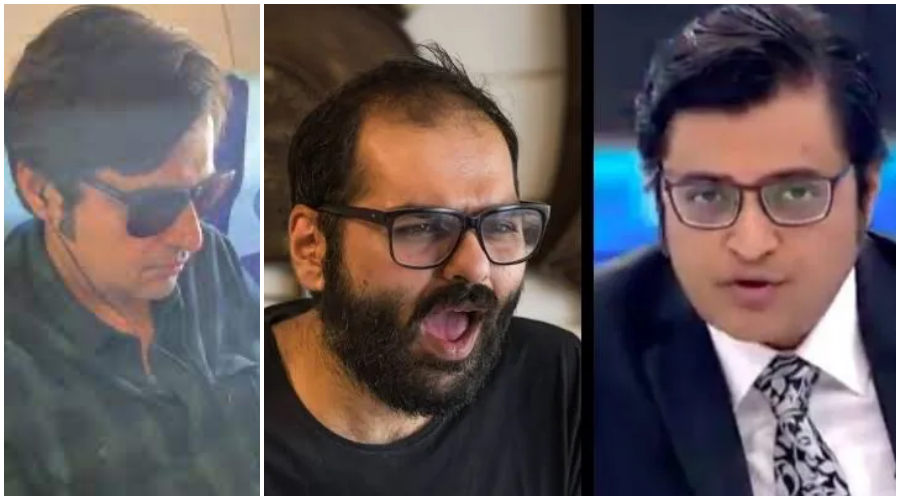The so-called standup comedian Kunal Kamra has been making waves, recently mocking Maharashtra Deputy Chief Minister Eknath Shinde by labelling him a ‘gaddar’ (traitor). His repeated political jibes, especially against nationalist figures, raise serious concerns. Given his affinity with Uddhav Thackeray—whose party has strayed far from its pro-Hindu roots established by Bal Thackeray—it is worth scrutinizing whether Kamra’s actions are mere comedy or part of a larger, more insidious agenda.
Kamra has built a reputation for brazenness. His refusal to apologize even to the Supreme Court during the Arnab Goswami bail case, his ridiculing of entrepreneur Bhavish Aggarwal, and his secrecy regarding his parental background all contribute to growing suspicion. More alarmingly, Kamra has openly supported controversial figures like Umar Khalid, an alleged mastermind of the Delhi riots, further fuelling doubts about his true motives.
Vijay Patel, a social media activist, has highlighted Kamra’s potential role in a coordinated propaganda effort. According to Patel’s findings, Kamra shares close ties with Umar Khalid and radical elements linked to Jamaat-e-Islami Hind, such as Nadeem Khan. These individuals played a significant role in the anti-Citizenship Amendment Act (CAA) protests and have been accused of orchestrating unrest in Delhi.

Furthermore, Kamra’s association with left-leaning media outlets like Alt News and The Wire—both frequently accused of disseminating biased narratives—raises further red flags. Reports suggest that media personalities such as Swara Bhaskar, Ravish Kumar, and Harsh Mander are part of a larger network attempting to manipulate public sentiment through misinformation and targeted defamation.
The links between Kamra, Nadeem Khan, Mohammad Zubair, and Pratik Sinha add another layer to the unfolding picture. These individuals have been consistently involved in amplifying narratives that weaken India’s social fabric. Evidence presented in court has already established that Khalid and his associates have used media as a tool to propagate their agenda. The same ecosystem that fuelled the Delhi riots now appears to be extending its reach to Maharashtra, potentially setting the stage for further disruptions.
Even more concerning is the possibility that this network is receiving foreign funding to destabilize India. Investigating agencies, including the National Investigation Agency (NIA), must scrutinize whether Kamra’s brand of ‘comedy’ is merely a facade for deeper, more dangerous propaganda efforts. His choice of targets—nationalist journalist Arnab Goswami and Eknath Shinde, a follower of Bal Thackeray’s ideology—suggests a deliberate attempt to erode strong nationalist voices in India.

The world is already witnessing the repercussions of unchecked radical influence. Several European nations, including Germany, France, and the UK, are realizing the dangers posed by extremist infiltration. A UK Parliamentarian recently sounded the alarm about the country’s potential slide into an Islamic Republic. The United States, too, under the leadership of former President Donald Trump, initiated aggressive measures to combat radical elements.
China, despite its harsh authoritarian measures, has managed to curb extremist threats through repressive tactics—though at the cost of human rights. Meanwhile, democratic nations, bound by their commitment to civil liberties, struggle to implement effective countermeasures against the creeping influence of radical ideologies.

Given these global developments, India cannot afford complacency. If left unchecked, figures like Kunal Kamra could serve as catalysts for widespread unrest. Intelligence agencies must investigate whether he is part of a broader ‘toolkit’ operation designed to destabilize the nation. The consequences of inaction could be severe, as India faces both internal and external threats aimed at weakening its democratic foundations.
The time to act is now. Kamra may present himself as a comedian, but the larger picture suggests something far more sinister. His associations, statements, and actions demand scrutiny, not dismissal. India’s security apparatus must rise to the challenge and ensure that those who seek to sow discord under the guise of free speech are held accountable.







